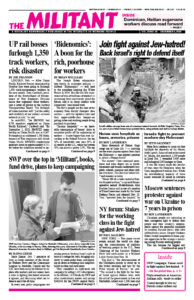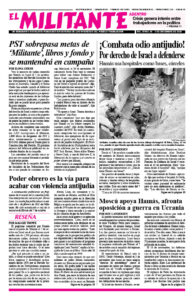Ukrainian people are unbending in their courageous fight to defend their people and their country’s independence against the genocidal onslaught by invading Russian forces, who have suffered heavy losses. Despite Vladimir Putin’s brutal clampdown at home, popular opposition to the carnage is mounting among Russian working people.
This has become the biggest war in Europe since the second inter-imperialist world slaughter. The Russian army has suffered staggering losses in the last few weeks as the brass sends conscripts in “human waves” trying to encircle Ukrainian defenses in Avdiivka in the Donetsk region.
At least 1,330 Russian troops were killed or wounded on Nov. 16 alone. Since Sept. 1, there have been over 51,000 casualties among the Russian workers in uniform, who Russian President Putin uses as cannon fodder. During this period, Moscow has lost some 2,400 tanks and armored vehicles. The outnumbered Ukrainian forces have stood tall.
As many as 17,000 Russian soldiers have deserted during the war. Many others have been executed for refusing to take part in suicidal frontal attacks. Russia’s prison population has almost halved as inmates are “recruited” for the war, with an offer of freedom for those who survive six months at the front.
Battle losses are disproportionately higher from non-Russian regions of the Russian Federation. Casualties from other regions, proportional to population, are 18 times greater than from Moscow. In republics like Buryatia and Dagestan or North Ossetia, 70% of the deaths of young men today are battle casualties.
Several weeks ago Ukrainian forces succeeded in crossing the wide Dnipro River near Kherson to create several beachheads on the Russian-held east bank. Despite heavy Russian shelling, hundreds of Ukrainian marines are fortifying these advanced trenches.
If these gains can be reinforced and advanced, they are poised to drive forward to the border with occupied Crimea, cutting key supply lines to Moscow’s forces.
In a sign of working-class sentiment building across Russia, relatives of draftees have called for a national day of protest Nov. 19 to demand, “Bring our men home.” Their manifesto, The Way Home, declared, “There are many of us and there will be even more.”
The statement says the signers aren’t for “destabilizing the political situation” but are “determined to get our men back at any cost.” It denounces the army for treating “military personnel as consumables” under conditions akin to “legalized slavery.”
Russian artist Alexandra Skochilenko was sentenced Nov. 16 to seven years in a penal colony for opposing Putin’s war. “Despite being behind bars, I am freer than you. I can make my own decisions and speak my mind,” she said in the St. Petersburg courtroom. The 33-year-old artist and musician has been detained since April 2022, charged with spreading “fake news” about the military.
The Kremlin imposed the harsh sentence to try to break Skochilenko and intimidate others. The prosecution claimed her anti-war position “undermines the foundations of the state order.” She is being denied treatment for her autoimmune and heart problems, and her health has deteriorated.
Her “crime” was to cover price tags at a St. Petersburg supermarket with tags citing the human costs of Moscow’s war. One note highlighted the number of civilians killed in the besieged city of Mariupol.
“Back then, it seemed safe,” Skochilenko’s girlfriend, Sofia Subbotina, told the Moscow Times. “But these past one and a half years have shown us that nothing in Russia is secure.”
Putin’s Justice Ministry announced that the Moscow Times was now on the government’s list of “foreign agents,” subject to harsh restrictions. This law is based on a similar witch hunt law still on the books in the U.S., used to frame up workers and political activists.
Skochilenko’s high-profile fight received backing from public figures in Russia and around the world. The feminist activist group Pussy Riot held a protest action demanding her release. More than 100 Russian doctors signed an open letter Nov. 18 calling for her to be freed.
“Thanks to my case,” she said, the information against the war “has reached thousands of people in Russia and around the world.”

